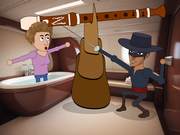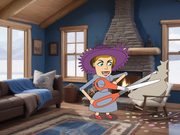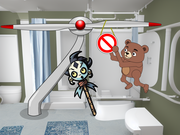常在河邊走,哪有不濕鞋
a person who regularly walks by the river cannot avoid getting their shoes wet (proverb) / (fig.) it comes with the territory (e.g. a person with the power to grant favors will inevitably succumb to temptation and take a bribe)
Characters and words in 常在河邊走,哪有不濕鞋
always / ever / often / frequently / common / general / constant
常
=
小
+
冖
+
吊
:
Charlie Chaplin is fighting his way through anglepod's underbrush with a coat hanger. The anglepod has not been visited in a hundred years, and with his coat hanger, Charlie Chaplin has to cut down a lot of daisies. Finally he found what he was looking for: the centennial light, protected from the daisies and the rain by a cooking top.
to exist; to be alive / (of sb or sth) to be (located) at / (used before a verb to indicate an action in progress)
river / CL:條|条[tiao2],道[dao4]
河
=
可
+
氵
:
A river has flooded the elevator, and in the kitchen, Hamlet is floating on a bed of nails. He found a water bottle to put upside down on the nails, so he has to balance on the bottle in order to not have to sit directly on the nails. It is quite difficult to do on a rocking makeshift raft.
to walk / to go / to run / to move (of vehicle) / to visit / to leave / to go away / to die (euph.) / from / through / away (in compound verbs, such as 撤走[che4 zou3]) / to change (shape, form, meaning)
走
=
龰
+
土
:
Mnemonic symbol: a Nordic walking pole. Zorro (z) is fighting Neanderthal Man (bottom of 龰) in the outhouse's living room (ou3). Neanderthal Man uses his pennant (top of 龰), and Zorro uses a Nordic walking pole (走). Zorro overcomes Neanderthal Man by using a dirty trick: he throws some dirt (土) at Neanderthal Mans face, who is blinded and hurts his foot with his pennant (the pennant pierces his foot: 龰). Just at this moment Zorro uses the opportunity to sedate Neanderthal Man and rams a syringe (龰) into his shoulder.
to have; there is / (bound form) having; with; -ful; -ed; -al (as in 有意[you3 yi4] intentional)
shoe / CL:雙|双[shuang1],隻|只[zhi1]
variant of 鞋[xie2]
Words with 常在河邊走,哪有不濕鞋
常在河邊走,哪有不濕鞋
is not used as a component in another word.
Sentences with 常在河邊走,哪有不濕鞋
常在河邊走,哪有不濕鞋 currently does not appear in any sentence.



